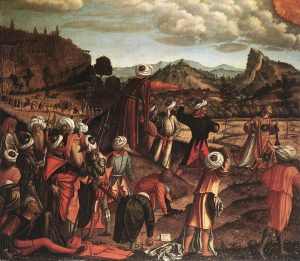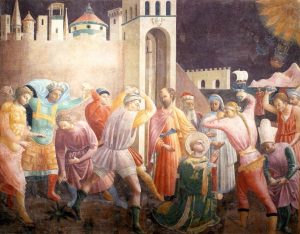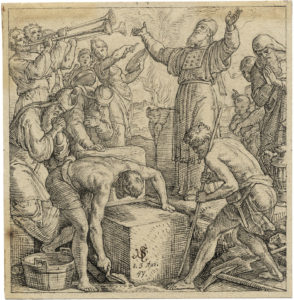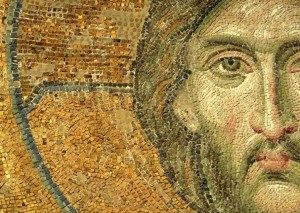Illuminations on the Lectionary readings for May 7, 2023 (Easter 5A)
First Reading: Acts 7:55-60
The resurrected Jesus is the way, and the truth, and the life, we hear in John’s Gospel on Sunday. No one comes to the Father except through him.

The Stoning of St Stephen (1520), tempera painting on canvas by Vittore Carpaccio (c.1460-c.1525). Staatsgalerie Stuttgart, Germany. (Click image to enlarge)
These deeply held ideas make it all too easy for Christians to imagine that we are the chosen ones, who alone reap the benefits of salvation. Whenever Scripture makes us feel this way, it’s time to dig into the details for a clearer understanding. In Sunday’s first reading we hear of the death of Stephen, traditionally the first martyr of the church. Stephen, one of the first Christian deacons, argued with fellow worshipers in the synagogue. They regarded his talk of Jesus as the Messiah foretold by the prophets as blasphemy. When Stephen declared his fellow Jews “betrayers and murderers” for their role in Jesus’s crucifixion and death, their anger overcame them and they stoned him to death. Stephen’s last words echo the hopeful cry of Psalm 31 that Jesus repeated on the Cross: “Into your hands I commit my spirit.”
Psalm: Psalm 31:1-5, 15-16
“Into your hands I commit my spirit.” Think about this: Both Jesus, dying on the cross, and Stephen, dying under the pounding weight of stones thrown by his community, uttered this same verse from Psalm 31. Even in the painful moment of death by violence, they confessed their faith. The Psalmist, too, seeking refuge and rescue, trusts in God’s fortress-like protection and steadfast love. He asks God for safety from enemies and persecutors; he begs God to listen, to be his stronghold, his rock and castle. He asks God to listen and to save him.
Second Reading: 1 Peter 2:2-10
Writing for the persecuted church in Asia Minor a few generations after the crucifixion, the writer of the first letter of Peter turns to the Psalms and the prophets to find ideas similar to those in Sunday’s Gospel reading from John. These verses recall the words that the Prophet Isaiah had used to promise that the Temple in Jerusalem would be rebuilt on a mighty cornerstone, a living stone that the builders had at first rejected. He calls on Christians not to stumble and fall on this stone as Isaiah’s people had done, but to grow into salvation like infants nourished on pure, spiritual milk, to proclaim the mighty acts of Jesus, who called us out of darkness into his light.
Gospel: John 14:1-14
For the last three weeks of Eastertide we will hear excerpts from John’s long account of Jesus’ last talk with the disciples before he is betrayed, arrested and crucified. In Sunday’s passage, Jesus tells them that he is going to go ahead to prepare a place for them. He tries to reassure them, telling them not to let their hearts be troubled; but they worry all the same, fearful because he is leaving and confused about what he means. Thomas asks how they will know the way, and Jesus responds with these familiar words: “I am the way, and the truth, and the life. No one comes to the Father except through me.” This is Jesus’s comforting word to his fearful disciples. Jesus himself is all they need; there is no need to be afraid. To know Jesus is to know God, right now and right here as we seek God’s kingdom on earth.



